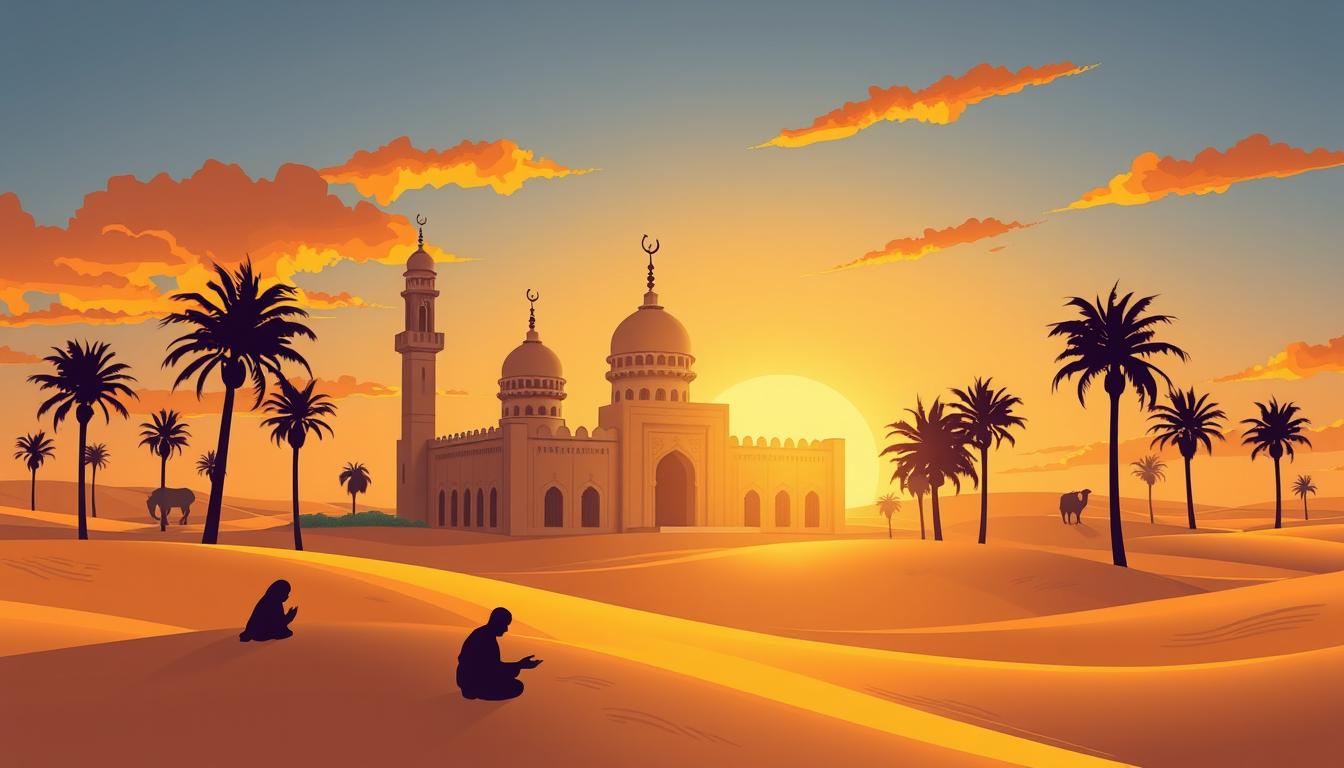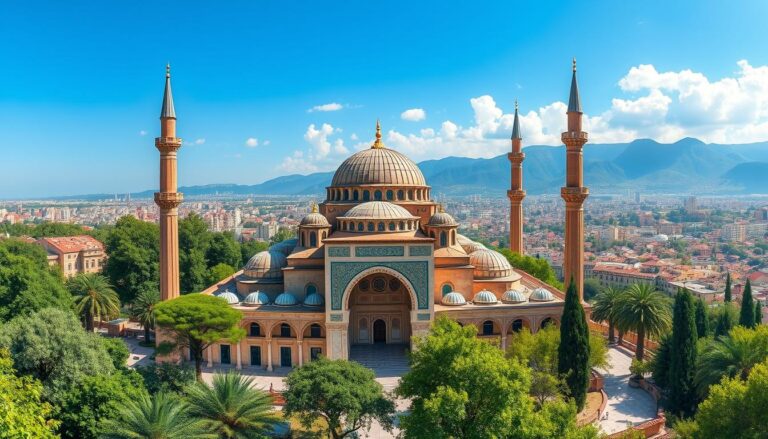Islam in Sudan
Islam is the main religion in Sudan, with about 97% of people following it, as the UNDP reports. Most Sudanese Muslims are Sunni, with a strong Sufi influence. The history of Islam in Sudan goes back to the 7th century AD.
The spread of Islam was helped by Arab traders and settlers. The Nubian kingdoms also played a big role in this process.
Sufi traditions and brotherhoods have greatly shaped Sudan’s Islamic culture. The Maliki school of Islamic law and Sufism are key to Sudanese beliefs. The Funj Sultanate, which emerged in the 16th century, helped solidify Islamic rule.
Islam’s history in Sudan has been influenced by many events. These include Egyptian-Ottoman rule and conflicts that have divided the country. Today, Islam is a big part of Sudanese life, with mosques and Sufi rituals being common.
Introduction to Islam in Sudan
Islam has been the main religion in Sudan for centuries. The country’s Muslim population is about 97%. Most Sudanese Muslims follow the Sunni branch, which is heavily influenced by Sufi traditions.
Islam arrived in the region in the 7th century AD. This was when Arab traders and settlers first met the local Nubian people.
Overview of Islam’s Presence in Sudan
The Nubian kingdoms, like Nobatia, Makuria, and Alodia, slowly adopted Islam. This took many centuries. Over time, Islam deeply influenced Sudan’s culture, society, and institutions.
This has shaped the country’s history and identity.
Historical Significance of Islam in the Region
Islam’s impact on Sudan’s politics is significant. Islamist movements, like the National Islamic Front (later renamed the National Congress Party), have been key. They played a big role in Sudan’s recent history, including the 1989 military coup.
Despite challenges and conflicts, Islam remains a core part of Sudan’s identity. It continues to influence its social, cultural, and political life.
“Islam has been the dominant religion in Sudan for centuries, with the country’s Muslim population estimated at around 97%.”
Spread of Islam in Sudan
The spread of Islam in Sudan took centuries. It started with the Muslim conquest of Egypt in the 7th century. Then, Arab traders and settlers came, bringing Islam with them.
Islamization of Nubian Kingdoms
The Christian kingdoms of Nubia were the first to adopt Islam. This change happened from the 7th to the 14th centuries. The Nubian people became more Arabized and started following Islam.
Role of Arab Traders and Settlers
Arab traders and settlers were key in spreading Islam in Sudan. They built trade networks and interacted with locals. This helped spread Islamic beliefs and practices.
The trans-Saharan trade, especially the slave trade, also helped Islam spread. By the 16th century, the Funj tribe in Sudan had adopted Islam. This led to the creation of schools along the White Nile for religious learning.
Sufi brotherhoods were also important in spreading Islam in Sudan from the 16th to the 17th centuries.
“The Islamization of the Sudan region occurred over a period spanning the 8th to 16th centuries, with Islamic missionary activity and Sufi orders playing a significant role from the 9th to 14th centuries.”
Sufi Traditions and Brotherhoods
Sufism, the mystical branch of Islam, has deeply influenced Sudan’s religious scene. Sufi orders like the Ansar and Khatmia have spread Islam and shaped Sudanese Islamic culture. Their rituals, festivals, and spiritual practices have deeply influenced Sudanese identity.
The Islamist movement in Sudan started in the 1940s, influenced by the Egyptian Muslim Brotherhood. Hassan Al-Turabi’s leadership helped the Islamic Liberation Movement and the Sudanese Muslim Brotherhood grow. This led to the Islamic Front for the Constitution in 1955, strengthening Islamist influence.
Sufi orders in Sudan, like Al Qadiriyah and Al Tijaniyah, have a 16th-century history. Many political leaders and notable figures are Sufis, including former President Jaafer Nimeiri. The zikr, or remembrance of God, is a key Sufi ritual. Hundreds of Sufis gather at mosques on Fridays for spiritual activities.
“During Prophet Mohammed’s birthday, Al Mawlid, all Sufi orders in Sudan come together for a 12-day massive celebration in Khartoum, commemorated in Rabi Al Awwal, the third month in the Islamic calendar.”
The Sufi influence in Sudan has deeply shaped its religious and cultural identity. The Hamid El-Nil Mosque in Omdurman is a popular Sufi mosque. It welcomes visitors to public Friday prayers, showing the strong Sufi traditions in the region.
The 2003 Oxford Scholarship Online collection provides insights into Sufi traditions and brotherhoods in Sudan. It explores the relationship between Sufi practices and other Islamic movements. This data highlights Sufism’s impact and influence in Sudan’s Islamic landscape.
Islam in Sudan: Maliki School and Sufism
In Sudan, the Maliki school of Islam is the main form of practice. It combines with Sufism’s mystical side. The Maliki school focuses on tradition and consensus. Sufism, with its mystical practices, shapes Sudan’s religious identity.
Sufism is a big part of Sudanese Islam. Orders like the Qadriyyah and Sammaniyyah have many followers. They influence Sudan’s culture and mix Maliki and Sufi traditions.
“Sufism has significantly influenced Sudanese Islam, making it one of the most tolerant Muslim-majority countries in the world.”
The mix of Maliki and Sufi traditions makes Sudan’s religious scene rich and diverse. Muslims in Sudan do Sufi rituals like dhikr. They also follow Maliki teachings. This mix promotes religious tolerance and diversity.
The Maliki school and Sufism have shaped Sudan’s Islamic identity. They create a unique Islamic tradition. This blend enriches Sudanese Islam, making it interesting to study.
The Funj Sultanate and Islamization
The Funj Sultanate rose in the early 16th century, playing a key role in spreading Islam in Sudan. Originally non-Muslims, the Funj soon adopted Islam. They became key in making Islamic rule strong in the area.
Rise of the Funj Kingdom
The Funj Sultanate, with Sennar as its capital, grew its power. It formed a loose group of sultanates and tribal leaders under its rule. This helped make Islam a lasting part of Sudan.
Consolidation of Islamic Rule
The Funj Sultanate lasted from 1504 to 1821. It was an Islamic Monarchy under a Sultan. Arabic was its official language, and Sunni Islam was the main religion.
Its peak was in the late 17th century. But, it started to decline in the 18th century. The Ottoman Empire conquered it in 1821.
“The Funj Sultanate was described as an ‘African empire with a Muslim façade’ prior to the 18th century.”
Now, about 70 percent of Sudan’s 25 million people are Muslims. Non-Muslims live in the Nuba Mountains and southern Sudan. The Funj Sultanate’s impact on Sudan’s religion and culture is huge.
Egyptian-Ottoman Rule and Islamic Influence
The Egyptian-Ottoman rule in Sudan started in the early 19th century. It greatly affected Sudan’s Islamic scene. The Ottomans wanted to control the area better, so they brought in Islamic institutions and Shari’a law.
This time had its challenges, but it also made Islam even more important in Sudan. It made Islam a key part of Sudanese life.
After Sudan was conquered by Muḥammad ʿAlī’s army in 1820-1821, Islamic influence grew. The new rulers took taxes in gold, livestock, and slaves, causing anger. But in 1826, a fairer tax system was set up, and those who ran away were forgiven, easing tensions.
Even with European Christians in the government, Islamic institutions in Sudan remained crucial. The slave trade, linked to the Egyptian-Ottoman rule, caused more problems. Governor-General Charles George Gordon tried to stop it, but faced opposition from slave traders and villagers.
The Shari’a law in Sudan was a big part of the legal system. The Ottomans used Islamic rules to strengthen their rule. This made Islamic practices and traditions even more important in Sudan’s culture and society.
Islam in Sudan and Conflicts
The history of Islam in Sudan is filled with conflicts. These have been both political and religious. The North-South divide has been a major source of tension. It has led to the First and Second Sudanese Civil Wars.
The Darfur conflict also involves ethnicity and religious identity. Islamic militancy has played a role in this conflict.
North-South Divide and Civil Wars
The divide between the Muslim north and the Christian and animist south is long-standing. This divide has caused the First and Second Sudanese Civil Wars. These wars were filled with religious and ethnic conflicts.
Millions of lives were lost. South Sudan eventually became an independent nation in 2011.
Darfur Conflict and Islamic Militancy
The Darfur conflict shows the complex religious and ethnic dynamics in Sudan. It started in 2003. Factors include the marginalization of Darfuri, competition for resources, and Islamic militant groups.
This conflict has displaced millions. It has been condemned for human rights abuses.
These issues have deeply affected Sudan’s social and political landscape. They test the country’s ability to unite its diverse communities. As Sudan moves towards democracy, solving these conflicts is key to lasting peace and stability.
Islamic Practices and Culture in Sudan
Sudan’s Islamic heritage is a big part of its culture and society. The country is filled with grand mosques and lively Sufi rituals. These show how strong Islam’s influence is.
Mosques and Islamic Architecture
The Sudanese skyline is marked by beautiful mosques. Each mosque shows off different Islamic architectural styles. The Khartoum Mosque’s tall minarets and the Omdurman Mosque’s detailed patterns are just a few examples.
The mosques in Sudan mix local and Islamic designs. They are not just for prayer but also for community events. Here, Muslims come together to worship, socialize, and celebrate their faith.
Sufi Rituals and Festivals
Sufism, a mystical part of Islam, has a big impact in Sudan. Sufi rituals, like dhikr ceremonies, are key to Sudanese Islamic life. These ceremonies involve chanting and movement to connect with the divine.
The mawlid festivals, celebrating the Prophet Muhammad’s birth, are also very important. These festivals are full of music, dance, and Sufi poetry. They highlight the rich Islamic culture of Sudan.
“The mosques and Sufi traditions in Sudan are a testament to the enduring power of Islamic faith in shaping the country’s cultural identity.”
Islam in Sudan
Islam has been the main religion in Sudan for centuries. About 97% of the people are Muslim. The spread of Islam was slow, helped by Arab traders and the Funj Sultanate.
Islamic traditions deeply shape Sudanese culture and society. The Maliki school and Sufi traditions are key in the country’s religious scene.
A 2020 Pew Research Center study found 91% of Sudan’s people are Muslim. Christians make up 5.4%, and 2.8% follow indigenous religions. The UN High Commissioner for Refugees reports 1,139,163 refugees and asylum seekers in Sudan.
The Sudan Council of Churches lists 36 Christian denominations, with 24 registered. Less than 1% of the population follows traditional African religions, mainly in Blue Nile and South Kordofan States.
The 2019 Sudanese constitutional declaration does not mention sharia as the basis for laws. It guarantees freedom of education and political party openness to all citizens. It also protects the right to practice beliefs, religions, or customs within the law.
“The constitutional declaration ensures the right of all ethnic and cultural groups to practice their beliefs, religions, or customs within the confines of the law and public order.”
In Sudan, most Muslims follow Sunni Islam of the Maliki school and are influenced by Sufism. There are Shia communities in Khartoum. Sudan had Sharia law under military regimes, causing issues for non-Muslims.
In September 2020, Sudan became a secular state. This ended Islamic rule after 30 years. The new laws also abolished the apostasy law and public flogging.
Sudan’s history shows Islamic rule in the north since the 7th century. The south was influenced by Islam and Christianity in the 19th century.
Conclusion
Islam has been a big part of Sudan’s history and identity for centuries. The spread of Islam has deeply influenced the country’s culture, society, and politics. As Sudan moves forward, Islam’s role will continue to be important.
The Islamization of Sudan has left a lasting impact. It started with Nubian kingdoms and grew with the Funj Sultanate. Sufism and the Maliki school of thought also shaped Sudanese Islam. Even through Egyptian-Ottoman rule and civil wars, Islam remained a key part of Sudan’s identity.
Understanding Sudan’s Islamic heritage is key to seeing its unique identity and challenges. Sudan faces the task of uniting its diverse religious and ethnic groups. The role of Islam in shaping Sudan’s future will be a topic of ongoing debate.
Source Links
- Sudan – Islam, Christianity, Animism
- Sudan – United States Department of State
- Arabization and Islamization in the Making of the Sudanese “Postcol…
- Sudan’s popular uprising and the demise of Islamism
- Sudan // Under Caesar’s Sword // University of Notre Dame
- Sudan – Islam, Spread, Africa
- Islamization of the Sudan region
- Islamism in Sudan
- Sufism in Sudan
- Islam in the Sudan: Moving Beyond the Crossroads?
- Islam in Sudan
- Religion in Sudan
- North Sudanese – Religion
- Funj Sultanate
- Bridging Cultures Bookshelf: Muslim Journeys
- The Southern Funj of the Sudan as a Frontier Society, 1820–1980 | Comparative Studies in Society and History | Cambridge Core
- History of Sudan – Egyptian-Ottoman rule over the Sudan
- Some Social and Economic Aspects of Turco-Egyptian Rule in the Sudan | Ağustos 1989, Cilt 53 – Sayı 207-208
- Gold, Arms, and Islam: Understanding the Conflict in Sudan
- Sudan’s civil war is rooted in its historical favouritism of Arab and Islamic identity
- Trade and the Spread of Islam in Africa | Essay | The Metropolitan Museum of Art | Heilbrunn Timeline of Art History
- Arabization and Islamization in the Making of the Sudanese “Postcol…
- Sudan – United States Department of State
- Sudan – Civil War and Genocide
- The Islamic Legal Revolution: The Case of Sudan







